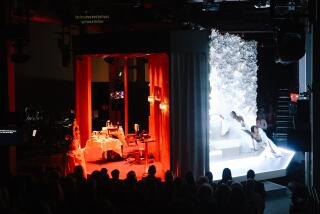Death Shows Absurd Face in ‘Emperor’
- Share via
Viktor Ullmann’s “The Emperor of Atlantis” is said to be the only opera written in a concentration camp. It is a work full of biting irony--biting but, miraculously, not bitter-sounding. One can discern the camp, the sense of living with death, in every moment of the opera, but an effort is made to transcend reality. The main characters are the farcical Death, who has lost his sting, and the ambiguous Emperor Overall, who has a problem with that. Ullmann both skewers and celebrates the human condition at a very basic level.
“The Emperor of Atlantis” was written in the show camp, Terezin, where the Nazis encouraged artists to paint, write and perform as part of a public relations scam, and then deported them to the death camps. Ullmann’s opera came close to a performance in 1944, but was forbidden at the last minute perhaps because it seemed to parody Hitler.
But that is a less obvious conclusion than you might imagine. The Emperor sacrifices himself at the end, and his death is deeply felt in the music. The theme is redemption--death may be tragic, even absurd, but it also must be liberating. The composer, who was in his 40s, and his much younger librettist, poet Peter Kien, found themselves on the next train to Auschwitz, where they perished.
Though only discovered by the public in 1975, when the hourlong opera finally had its first performance in Amsterdam, “The Emperor of Atlantis” has since then had many productions and at least three recordings. On Tuesday night, a large crowd, despite little advance publicity, turned out for a performance of it at the Hollywood American Legion by a visiting Austrian new music ensemble, ARBOS, which specializes in experimental music theater and also theater for the deaf. The production was sponsored by the Los Angeles Museum of the Holocaust with support from the Austrian government.
Ullmann was a sophisticated composer who had studied with Schoenberg and run a provincial opera company. His career, however, was not particularly successful. He struggled to come to terms with different poles of modernism and populism that divided European music in the ‘30s. It was apparently only in the conditions of Terezin that he found a new voice, and his opera--which is a kaleidoscope of references to Berg and Mahler and the blues, to cabaret and the Brecht/Weill music theater, to commedia dell’arte and oratorio--is said to be his masterpiece. For Ullmann, the terrible restrictions of prison life inspired him to rethink his musical language; the cloud of death that hung over him made him newly appreciate life.
But if “The Emperor of Atlantis” is an opera that transcends Terezin, ARBOS was determined to remind us of camp life. The ensemble uses no set or stage properties, just a large table as a makeshift stage. The six singers, 13 musicians and conductor glumly trundle in wearing bathrobes, carrying instruments or bundles of old clothes. Their job then is to put us in the camp and then take us out of it again using nothing but music, acting and singing.
This is no easy task. Universal war is declared, but no one can die. Death, sick of it all, is mocked by Harlequin. The powerless, sequestered Emperor is beside himself but also bemused. A disembodied singer, called Loudspeaker, reports the preposterous outside world. Two soldiers, when they find out they can’t kill each other, fall in love instead. For this production, Death regains his power in drag, dressed as an old lady, convincing the Emperor to be his victim.
The performance was riveting. The singers were exciting, making every word, gesture and tone mean something. The director, Herbert Gantschacher, built dramatic castles out of rags and air. David Currie conducted a flawless instrumental ensemble. The company, however, suffered a restless audience, which was not given a libretto or even an adequate synopsis of the complicated German text.
At the end, though, as we filed out behind the company, again cheerless in their bathrobes, we were greeted by another large table: this one decorated with fancy cakes and pastries.
* A symposium about Ullmann’s opera, and other music composed in the camps, will be held tonight at 7:30, Beverly Hills Presbyterian Church, 505 Rodeo Drive. Free. (323) 761-8170.
More to Read
The biggest entertainment stories
Get our big stories about Hollywood, film, television, music, arts, culture and more right in your inbox as soon as they publish.
You may occasionally receive promotional content from the Los Angeles Times.











